Addiction
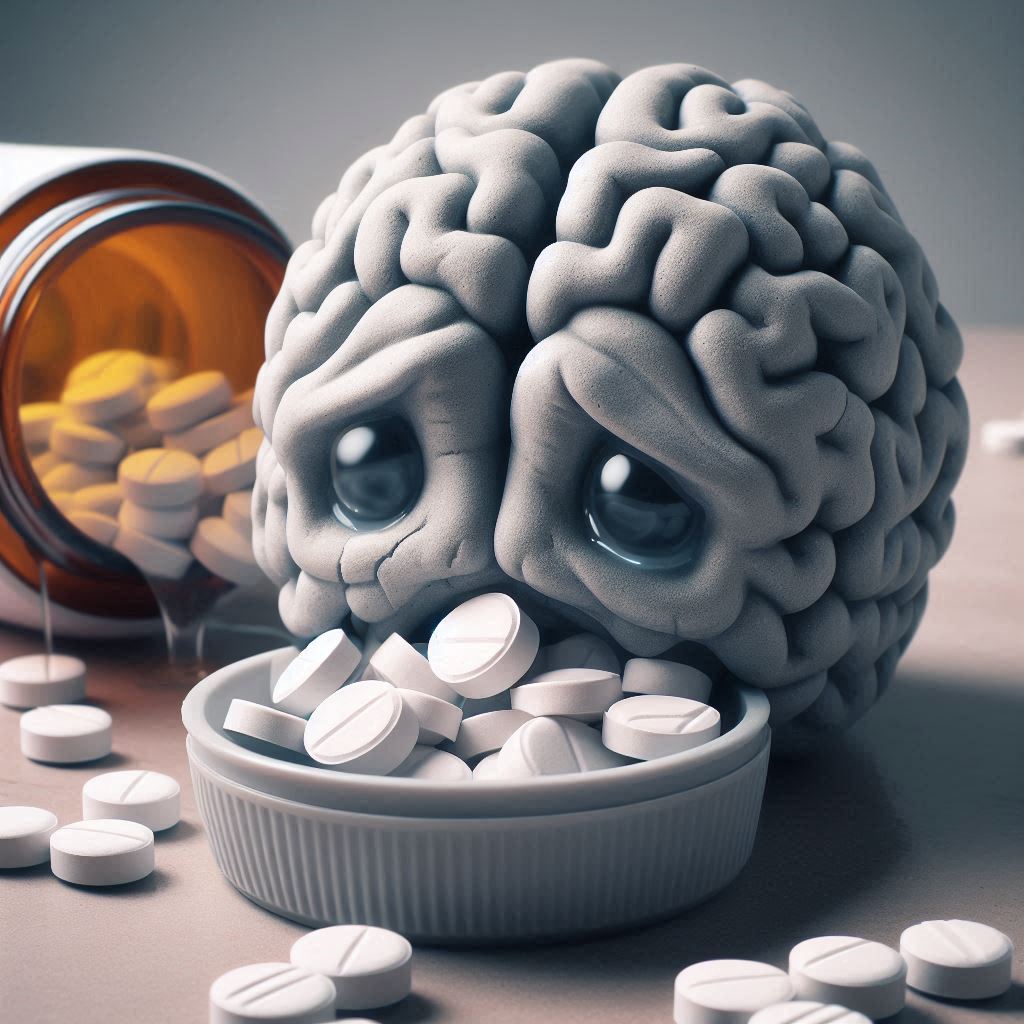
Addiction is bad. Don't do the same thing over and over again.
Moderation and diverse sources of happiness are the path to prevention.
"Alcoholism is a disease, but it's the only disease you can get yelled at for having." -Mitch Hedberg, Strategic Grill Locations
Drugs are the most talked about addiction, but hardly the most common. Monetary addiction and food-based addictions are even more common in the age of modern capitalism and overabundance. Sex addiction plagues the ridiculously good looking. Spiritual addiction brought you this wiki. Anything can be an addiction if you do it often enough that it detracts from your happiness. It's definitional.
Addiction, Neurons, and Feedback Loops
Addiction occurs when the feedback loop that rewards some pleasurable action becomes so dominant that it crowds out other sources of reinforcement, to the point of significant diminishing returns on happiness and rising negative consequences.
It's a neural pathway that has been repeated so many times that it has synaptic connections to all kinds of stimuli, making it very easily triggered. It is like the god concept except god is replaced by drugs, shopping, sex, gambling, or whatever the person is addicted to. Once triggered, it is very hard to switch to any other neural pathway until the addictive behavior has been completed.
Addiction and Free Will
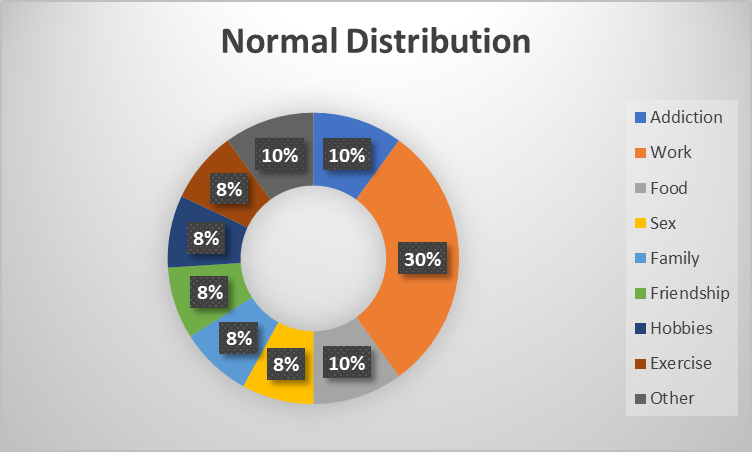
Addiction effectively limits what free will we have by narrowing the range of possible choices we can make, due to limits on time, money, and the low salience of other activities compared to the addiction.
Free will is an illusion. We can't choose to do anything at any point if we have sufficient willpower. We have a discreet number of things we do to feel good, and each one has a probability associated with it that determines how often we'll choose that thing. Things with a high salience for us have higher probabilities, like food, sex, hobbies, and parties. Then there might be a few dozen other activities we do from time to time but not regularly that have low probabilities. Every day we roll the quantum dice and do whatever our neurons decide.
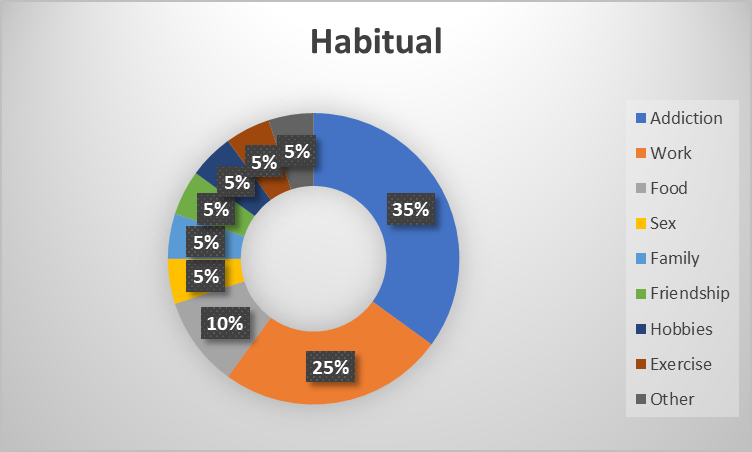
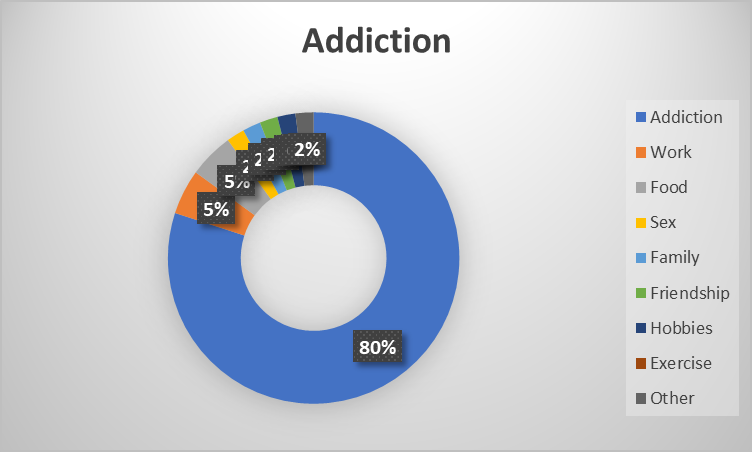
Addiction increases the probability of the addictive behavior and decreases the probability for every other source of pleasure. The best simulation of free will is having as many possible behaviors with non-zero probabilities that might be chosen. Addiction eventually reduces everything else to zero, which is why many say that it "takes away our free will".
The graphs on this page are meant to illustrate this point, not to provide real measurements of behavioral probabilities. The point is that addictive behavior crowds out our ability to do the many other things in life that bring us happiness.
Anything Can Be Addicting
Anything that your brain finds salient can become the source of an addiction. Whether you are stimulating your pleasure centers directly with drugs or indirectly with food, sex, money, conspiracy theories, spirituality, or newsfeeds, anything that can give you a hit of dopamine can become an addiction. All it takes is to allow the feedback loop of reinforcement to continue increasing the salience of the behavior until its probability is so high that you stop seeking pleasure from other sources.
To counteract this, we simply must seek diverse sources of pleasure and never let any one favorite activity crowd out the others. Our brains need all of the instinctual forms of pleasure to maintain a state of happiness. Deficiencies in any category cannot be made up with overindulgence in another.
When you look at addiction as any repetitive behavior or thought loop that continues to happen even when you would rather not, a wide range of mental conditions fall under this definition. Depression, anxiety, OCD, eating disorders, and many others can all be seen as different manifestations of addiction. This is why psychedelics are effective at treating so many different things. They open new neural pathways that make it easier to avoid falling into ingrained patterns. They also help form the god concept, allowing you to get your happiness from within.
Creating a Culture of Moderation
Through moderation we can find ways to enjoy the pleasures of the universe while consciously avoiding addiction by regulating temptation with incentive structures based on best practices.
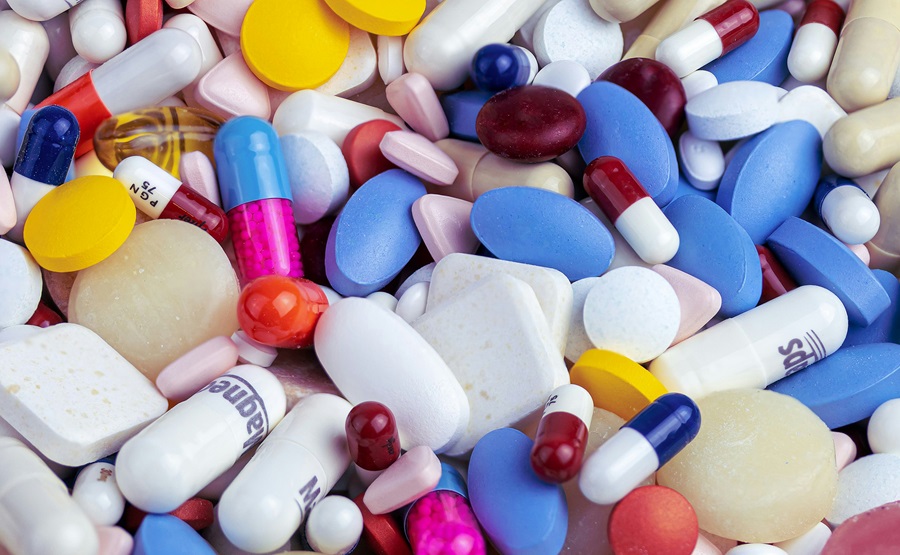
A lot of these incentives needs to be cultural since the legal system can't tell you how often to do something, only whether or not getting caught will result in some consequences. A culture that celebrates excess, one of the hallmarks of modern capitalism, actively undermines moderation and promotes addiction in all areas. Instilling ethics and cultural norms that encourage curiosity and diverse interests and discourage extreme, obsessive, or repetitive behavior, would reverse the social incentives that drive people towards addiction.
Consumerism promotes the destructive meme that emotional problems can be solved by buying things, and that satisfaction comes from outside and not within. This creates addiction by design. Creating obsessive behavior targeted towards your brand is the goal of all advertising. We can have capital markets without allowing companies to poison the culture and undermine human happiness. But, once again, the legal system is ill-equipped to enforce this through regulation. It must be done through the widespread adoption of new cultural norms that treat consumerism with derision instead of celebrating it.
Variable Reinforcement and Addiction Technology
Understanding the power of variable reinforcement [1][2] is essential to avoiding the many pitfalls of modern capitalism. The people who design modern technology, from social media platforms to video games, casinos, and advertisers, all know how to use variable reinforcement techniques to get you addicted to their products. To survive in this world you must also understand how variable reinforcement works, recognize when it is being used to control your behavior, and actively seek to avoid it.
Podcasts About Addiction and Habits
If you thought there wouldn't be a relevant Hidden Brain episode on this topic you thought wrong!
- Creatures Of Habit
- You 2.0: Your Future Is Now
- You, But Better
- The Curious Science of Cravings
- Smoke and Mirrors
- The Lazarus Drug
Addicted to YouTube
YouTube addiction is very real.[3] The algorithm is designed specifically to feed you the videos that are most likely to keep you watching. metaculture will at least try to send you down the right rabbit hole..